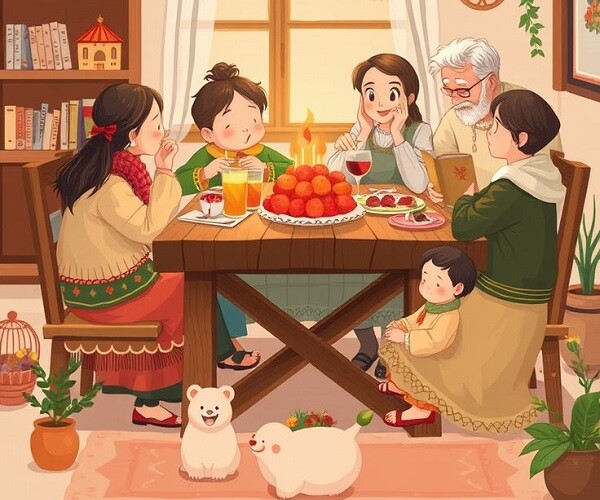Maintaining harmonious relationships with family and loved ones is of utmost importance as we age. For older parents, family, society, and relationships can become complex, so it’s essential to remain wise and thoughtful.
For one’s peace of mind and family harmony, the following are four things parents should refrain from complaining about or discussing with their children, according to traditional wisdom.


Wealth distribution plans: “Mom will leave 30% of her wealth to you, 40% to your sister…”
Many family conflicts arise from disputes over wealth distribution. Even the most filial children may feel upset if they perceive their parents as favoring their siblings or being unfair.
Unequal distribution of wealth can lead to jealousy and resentment, damaging the relationship between siblings. When there is a perception of inequality, feelings of being wronged often arise, leading to unnecessary arguments and conflicts.

Children may feel that their efforts and contributions are not recognized, leading to conflicts not only among siblings but also with their parents. For this reason, parents should refrain from hastily revealing their wealth distribution plans.
Instead, engage in open discussions about the values, principles, and ideals that the family wishes to uphold. Creating an open and honest family environment will make it easier for everyone to share their thoughts and feelings.

Favoritism within the family: “Sometimes, Mom admits to favoring your sister over you…”
The saying, “All fingers are not the same length,” reminds us that differences within a family are inevitable. Parents cannot guarantee complete fairness among their children in terms of affection or material things.
Whether you are a parent or a child, it is best to let go of any sense of unfairness within the family as early as possible. Otherwise, negative emotions will accumulate and affect relationships between family members.
Bringing up the past will only increase tension and discomfort. Stories of favoritism or injustice will become a burden, making people feel uneasy.


Conflicts with relatives and neighbors: “Mom doesn’t like Mrs. B next door…”
In life, we need to communicate and connect with those around us, especially our relatives and neighbors. These relationships can provide support and comfort during difficult times.
However, conflicts and disagreements are sometimes unavoidable. Differences in opinions, lifestyles, or even minor misunderstandings can lead to tension and disputes.
Older parents, in particular, should avoid conflicts with those around them. When parents live harmoniously with their neighbors and relatives, their children, even if they live far away, will have greater peace of mind, knowing that their parents are in a positive environment free from unnecessary stress.
Learning to let go and striving for reconciliation is best for both the family and others. This promotes good mental health for aging parents and fosters better relationships with those around them.


Worries about their children’s lives: “You’re still a child who needs taking care of”
In a parent’s eyes, their child will always be a source of concern and worry, regardless of their age. A parent’s love for their child is eternal, whether they are adults or have families of their own.
However, this can sometimes lead to conflicts when parents interfere too much in their children’s lives. Therefore, parents should reduce their interference and provide more support and recognition to benefit the parent-child relationship and maintain family harmony.
When children feel respected and trusted, they develop confidence and independence. This enables them to be more self-reliant and strengthens the bond between generations.
As children reach adulthood and start their own families, parents should also learn to let go. This does not mean abandoning responsibility or love but rather allowing children to make their own decisions and take responsibility for their lives.
This letting go provides space for their children’s growth and development while reducing pressure on both sides.

Within the family, parents are the binding force that connects all members. They are not only caregivers but also memory-makers, culture-builders, and value-instillers for future generations.
By maintaining and strengthening family relationships, parents create a warm and loving environment where everyone feels accepted and respected.
Additionally, parents can encourage shared family activities, such as family dinners, vacations, or holiday celebrations. These shared experiences foster stronger and closer bonds between family members.
The Skilful Mother: Unlocking the 3 Secrets to Bring Luck and Prosperity Home
A wise mother knows the importance of maintaining respect and love among family members. She is the glue that holds the family together, fostering an environment of harmony and understanding. With her gentle guidance, the family thrives, and each member feels valued and appreciated. Her influence extends beyond the home, as she teaches her children the value of respect and love in all their interactions. This mother is a beacon of wisdom, a role model for her family and a source of strength and unity.



































